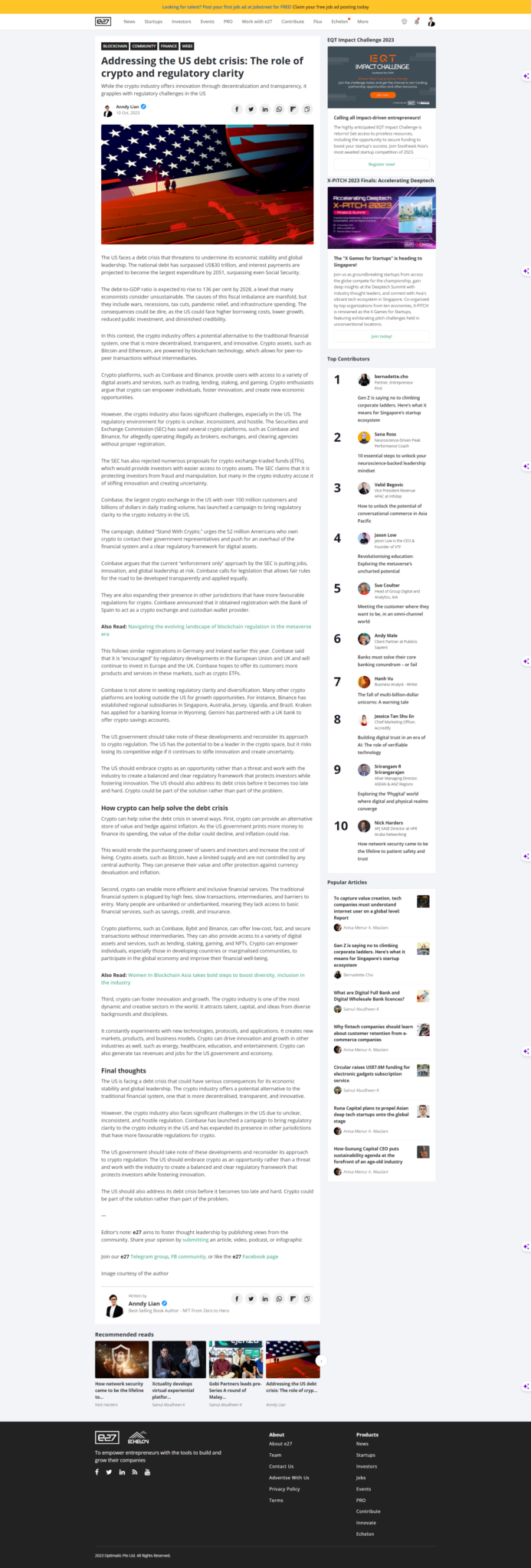The landscape of US politics is undergoing a significant transformation, particularly in its approach toward cryptocurrency. Recent developments suggest a marked shift towards a more pro-crypto stance, with potential implications for the future of digital assets in the American economy. This transformation is evident in the actions and rhetoric of key political figures and the legislative trajectory concerning cryptocurrency regulation.
Historically, the US political environment has been characterized by a cautious, if not skeptical, stance towards cryptocurrency. Regulatory bodies, particularly the Securities and Exchange Commission (SEC), have taken a stringent approach, often viewing digital assets through the lens of traditional securities laws. This has led to a series of regulatory actions aimed at curbing what is perceived as the speculative and risky nature of cryptocurrencies. However, the winds of change seem to be blowing, and the 2024 election cycle may very well be a pivotal moment for the crypto industry.
One of the most striking developments in this regard is the increasing support for crypto-friendly policies among prominent political figures. Former President Donald Trump, who once dismissed Bitcoin and other cryptocurrencies as a “scam,” has seemingly shifted his stance. During a recent fundraising event at his Florida residence, Trump positioned himself as a potential pro-crypto president, garnering significant attention from the cryptocurrency community. His alignment with the crypto sector could signal a broader Republican embrace of digital assets, contrasting sharply with the traditionally more cautious approach of the Democratic Party.
This shift is not limited to rhetoric. Legislative actions also reflect a growing pro-crypto sentiment. On May 22, 2024, the US House of Representatives approved the Financial Innovation and Technology for the 21st Century Act (FIT21). This bill represents the first significant piece of crypto legislation to pass one of the chambers of Congress, marking a potential turning point in how digital assets are regulated. The bill’s passage is particularly noteworthy given the historical reluctance of many Democrats to support crypto legislation, fearing it would legitimize an industry they view with suspicion.
The bipartisan support for FIT21 underscores the changing political dynamics. Notably, former Speaker of the House Nancy Pelosi has expressed support for the bill, indicating a willingness to work across the aisle on crypto-related issues. This is a significant departure from the previously adversarial stance many Democrats held towards cryptocurrencies. Pelosi’s support suggests that even within the Democratic Party, there is a growing recognition of the importance of integrating digital assets into the broader financial system.
The shift towards a more pro-crypto stance is also evident in the actions of the SEC. SEC Chair Gary Gensler has been a vocal critic of the crypto industry, advocating for stringent regulations to protect investors and maintain market integrity. However, there is increasing resistance to this approach within Congress. On May 8, 2024, the US House of Representatives voted in favor of a resolution opposing the SEC’s crypto accounting policy, which had deterred banks from handling crypto customers. This resolution, if adopted, would ease the regulatory burden on banks dealing with cryptocurrencies, potentially fostering greater institutional adoption of digital assets.
President Joe Biden’s stance on cryptocurrency has also evolved. Initially, the Biden administration appeared to support the SEC’s stringent regulatory approach. However, faced with declining approval ratings and a growing recognition of the economic potential of cryptocurrencies, the administration has shown signs of softening its stance. On May 22, the White House indicated that President Biden would not veto the House’s decision to oppose the SEC’s accounting policy, signaling a potential shift towards a more accommodative regulatory environment for cryptocurrencies.
The political calculus surrounding cryptocurrencies is influenced by several factors. First, there is a growing recognition of the economic potential of digital assets. Cryptocurrencies and blockchain technology have the potential to revolutionize various sectors, from finance to supply chain management. By fostering innovation and attracting investment, a pro-crypto stance could spur economic growth and job creation, key priorities for any administration.
Second, the increasing adoption of cryptocurrencies among the American public cannot be ignored. A survey conducted by Pew Research found that nearly 17% of Americans had invested in, traded, or used cryptocurrencies. This growing user base represents a significant voting bloc, particularly among younger voters who are more likely to engage with digital assets. Political leaders who align themselves with the crypto community could gain a strategic advantage in upcoming elections.
Additionally, the geopolitical landscape plays a crucial role. As other countries, particularly China, via Hong Kong, make significant strides in developing their digital currencies and blockchain infrastructure, there is a growing sense of urgency for the US to maintain its technological and economic leadership. Embracing cryptocurrency could be seen as a strategic move to ensure that the US remains at the forefront of financial innovation.
Despite the growing pro-crypto sentiment, there are significant challenges and risks that need to be addressed. The volatility of cryptocurrencies remains a major concern. The dramatic price swings of assets like Bitcoin and Ethereum can lead to substantial financial losses for investors. Regulatory clarity is essential to protect consumers and ensure market stability. This includes establishing clear guidelines on issues such as taxation, anti-money laundering (AML) compliance, and investor protections.
In conclusion, the current state of US politics is increasingly turning pro-crypto, driven by a combination of economic, geopolitical, and electoral considerations. The support from key political figures, coupled with significant legislative developments, indicates a shift towards a more accommodative regulatory environment for digital assets. However, this transformation is not without its challenges. Ensuring regulatory clarity, protecting consumers, and addressing environmental concerns will be crucial in shaping the future of cryptocurrency in the US. As the 2024 election approaches, the stance of political leaders on cryptocurrency will likely play a pivotal role in shaping the industry’s trajectory and its integration into the broader financial system.


Anndy Lian is an early blockchain adopter and experienced serial entrepreneur who is known for his work in the government sector. He is a best selling book author- “NFT: From Zero to Hero” and “Blockchain Revolution 2030”.
Currently, he is appointed as the Chief Digital Advisor at Mongolia Productivity Organization, championing national digitization. Prior to his current appointments, he was the Chairman of BigONE Exchange, a global top 30 ranked crypto spot exchange and was also the Advisory Board Member for Hyundai DAC, the blockchain arm of South Korea’s largest car manufacturer Hyundai Motor Group. Lian played a pivotal role as the Blockchain Advisor for Asian Productivity Organisation (APO), an intergovernmental organization committed to improving productivity in the Asia-Pacific region.
An avid supporter of incubating start-ups, Anndy has also been a private investor for the past eight years. With a growth investment mindset, Anndy strategically demonstrates this in the companies he chooses to be involved with. He believes that what he is doing through blockchain technology currently will revolutionise and redefine traditional businesses. He also believes that the blockchain industry has to be “redecentralised”.




